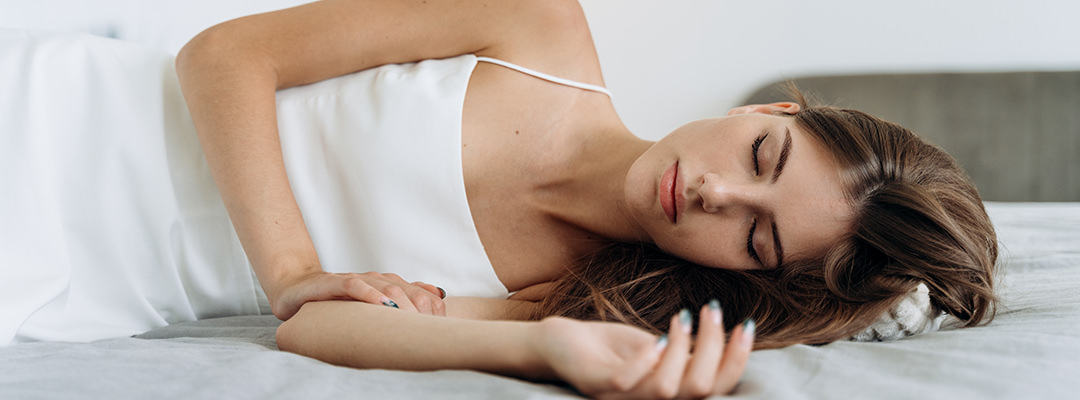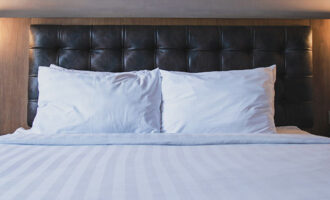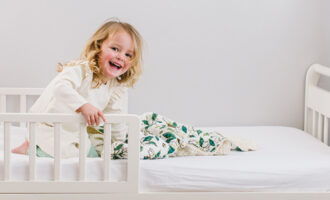How many times have you heard someone tell you they needed an early night so they could “get some beauty sleep”? Or maybe you’ve used it as an excuse yourself when you didn’t feel up to a wild night out with your friends. But is “beauty sleep” a real phenomenon? Or is it just an old wives tale?
Turns out, those old wives might have been on to something. Let’s look at what beauty sleep is, exactly, what it can do for your complexion and overall appearance, and how to get your beauty sleep working for your health in the best possible way.
What is beauty sleep?
“Beauty sleep” refers to the period when your body goes into “repair mode”. When we sleep, our levels of cortisol — or the “stress” hormone that does all sorts of unflattering things to our bodies — go down. Our bodies enter their recovery mode and release growth hormones that work to undo the damage from stress and our environment that has accumulated throughout the day. When we get a solid, healthy night’s sleep, our bodies are able to regenerate and regulate our hormone levels in the healthiest possible way.
What happens when we don’t get enough beauty sleep?
Lack of sleep has, unfortunately, become the norm in our society. Apart from the negative effect on our relationships and our mental well-being, poor sleep habits can have a huge effect on our appearance.
A lack of sleep can increase levels of cortisol and impair collagen quality, leading to dull, blotchy skin and acne. Several studies have also found that poor sleep actually speeds up aging and even inhibits our ability to repair sun damage! All of this leads to more fine lines and uneven coloring in the skin — all around not a good time.
Benefits of beauty sleep
With that in mind, let’s look at some of the benefits of getting a good night’s beauty sleep. In addition to looking better and feeling better, you might even save some cash from all those anti-aging products you no longer need to buy.
Fewer wrinkles
When you’re in deep sleep, your body increases the amount of blood flowing to your skin. This is when your skin begins to repair, rebuild, and produce more collagen (the thing that’s costing so much in your facial serum!), as well as heal from the sun and other environmental factors. This step in your sleep helps prevent wrinkles and loss of elasticity.
Brighter eyes
Eye creams are another thing that’s making the beauty industry some major bank in the last few years, and it may have something to do with the fact that none of us are getting enough sleep. Suffering from sleep deprivation can cause swelling around the eye area and dark undereye circles which can be tricky to get rid of. Getting enough beauty rest and amping your natural collagen production is a healthy (and free!) alternative to those nasty invasive surgeries.
Clearer, healthier skin
When you’re well-rested, your body’s stress hormones are more balanced. When you deprive yourself of sleep, your body produces more of these hormones which can lead to nasty breakouts. It can also exacerbate pre-existing skin conditions like chronic acne and eczema. Plus, encouraging more blood flow to the skin as you sleep contributes to a more even skin tone and healthier-looking skin.
Improved mood
It’s no secret that we get a little grumpy when we’ve underslept. While poor sleep does no favors to our mood, hearing people gently tell us that we look “tired” all day can only make things worse. When you wake up looking and feeling fresh, you’ll find your mood improving through the rest of the day too. Bonus: feeling better about ourselves will make us more productive, too.
Regulated weight
Poor sleep habits have been proven to have an effect on our weight gain, for a few reasons. Sleep is essential in regulating your metabolism and keeping you at the healthiest weight for your body; it also inhibits fat loss, making it harder to shed any unhealthy extra weight. Plus, poor sleep encourages the production of ghrelin, a hormone that stimulates your appetite and causes you to eat more. By getting a good night’s sleep, your body will find it easier to stay off the junk food and maintain a healthy body mass.
Healthier hair
Your sleep habits are directly correlated to your stress levels, and if your stress gets out of hand it can lead to some pretty dismaying hair loss. A good sleep has a direct positive effect on your hair growth, too — because sleep promotes healthier blood flow, your body will carry a higher amount of oxygen and nutrients to your hair follicles, resulting in healthier, fuller hair. When your hair isn’t getting enough of these nutrients, on the other hand, it’s weaker and more prone to breakage.
How much beauty sleep do we need?
The oft-quoted “eight hours of sleep a night” is actually a pretty good benchmark to measure your beauty sleep by; the National Sleep Foundation recommends that adults get between seven and nine hours of sleep per night for optimal health.
It’s also important to try and match these sleeping hours to your body’s natural circadian rhythm. Your body is most restorative during deep REM sleep at right about the middle of the night. If you stay up until the small hours and sleep late into the day, you’re probably not getting the same quality of sleep as you would if your sleep rhythm fell somewhere between the hours of 10pm and 10am.
Bottom line? If you’re sleeping less than six hours a night, or if your sleep is drastically out of line with what your body needs, it’s going to show up in your physical appearance.
How to get the most out of your beauty sleep
All of this is great news for our bodies, complexions, and overall well-being. In addition to getting a good night’s sleep, there are a few things you can do to make sure your beauty sleep is doing the most for you it possibly can.
Avoid caffeine at bedtime
It might be tempting to throw back some energy drinks during a last-minute study crunch, but caffeine isn’t doing your sleep cycle any favors. Caffeine remains potent in your body for a minimum of five hours, and having it in your system will make it harder to settle into a deep, comfortable sleep. This means that even if you do sleep for eight hours, you won’t be getting the maximum beauty benefits.
Wash your face before bed
No matter how tired you are at the end of the day, try to give your face at least a quick once-over with a cleanser (hint: keep a pack of travel cleansing wipes nearby for those days when you just can’t be bothered to care about anything). If you still have traces of makeup and city grime left on your face when you go to sleep, your skin won’t be able to regenerate and repair to the best of its ability.
Use soft, clean pillowcases
This circles back to cleanliness and giving your skin a fighting chance to breathe during the night. Your pillowcases are hotbeds of dust and grime, and smooshing all of that back into your face while you sleep isn’t doing your complexion any favors. Try to choose smooth pillowcases with little to no friction — silk is a classic and popular choice for this reason — and wash them once a week at least. This allows your skin to heal with a clean slate for the next day.
Stay hydrated
We all know that hydration is super essential for our bodies, both for our looks and our health. Water promotes elasticity in the skin and keeps it from showing signs of aging. Your skin naturally dries out during the night, so be sure to drink lots of water during the day and use a moisturizing cream if you have drier skin.
Avoid light while you sleep
To get the most benefit from your sleep, stay away from light sources as much as you can during the night. This especially includes your phone screen, but also overhead lights and daylight sources in the morning. Put the phone away before you get ready for bed, try to minimize any hallway lights, and keep your curtains drawn so that the sun doesn’t wake you before you’re good and ready (or before your alarm decides that you’re as good and ready as you’re going to get). This way you’ll be able to fall into a deeper, more beneficial sleep so that your body can heal.
As you can see, beauty sleep is more than just a Victorian cliché. While society is spending millions upon more millions on skincare products, weight-loss regimes, and hair care, we could be doing our bodies (and wallets) a huge favor simply by getting a better sleep at night. Try shifting your routine to get a solid eight hours of deep, healthy, uninterrupted sleep; your body and your complexion will thank you.
Did you like it?4.5/5 (25)





